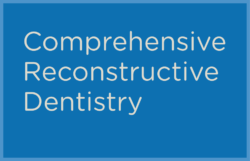The crossover of general dentistry into restorative, comprehensive, reconstructive dentistry occurs when there are complicating factors in the general dentistry. There are frequently many teeth needing a combination of crowns or bridges, implants, and some element of occlusal rehabilitation, orthodontics, and/or cosmetic correction.
The process all starts with accurate diagnosis. Dr. Caughey uses high-tech scans and 3-D modeling to carefully engineer implants, crowns and bridges. Most often, this type of dentistry requires a careful coordination of care between the restorative dentist and specialists involved. Dr. Caughey manages the coordination between the patient and other specialists involved in the reconstructive dentistry needed.
Many TMJ Dysfunction patients will have a combination of issues that need to be solved in the correct order. The jaw joints, musculature, and disk must be stabilized first – typically with a bite splint. Then diagnostic models can be made to plan to how changing the teeth will further support the damaged TMJ. This may involve referral to an orthodontist for braces, or porcelain veneers and onlays to reconstruct the bite.
In the case of dental implants, a low-radiation CBCT “cat” scan is our standard of care in planning the placement of implants, as dental implants must be fully supported by the jaw bone. If the jaw bone is too thin or too shallow, referral to an oral or periodontal surgeon is critical to use bone grafting to create enough healthy bone in order for the implant to have maximum longevity. Dr. Caughey works closely in coordinating this type of care – while she does not place the implants herself, she does take responsibility for the position of the surgeon’s implant. After fully studying the 3-D X-ray, Dr. Caughey combines that data with physical models of the patient’s mouth to enable fabrication of a custom surgical placement guide, that the surgeon then uses for implant placement.
While dental implants can frequently be used to replace a single tooth without much impact to the adjacent teeth, there are situations that affect the teeth, bone, and gum tissue of the rest of the mouth. When teeth are missing due to trauma or repeated infections, the result can be devastating cosmetically, leaving an architecture to the dental arch that is either not suitable for dental implant restoration, or – if implants were placed – would result in an obvious cosmetic defect. In this case, Dr. Caughey will plan for the ceramic restorations to include pink porcelain gums, to conceal the cosmetic dentistry defect. This also reconstructs the support for the lip, and allows better phonetics.


